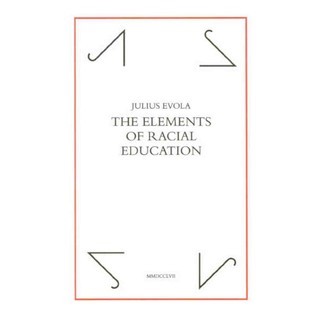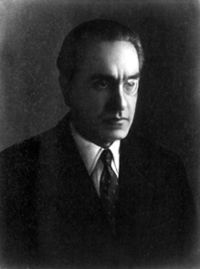
In this text, Evola examines the meaning of race in the context of traditionalism. Evola explains that race is not simply a biological accident, but serves a higher purpose towards reaching liberation of the soul. As always, Evola insists that one's spiritual race is even more important than one's biological identity. 'The title of this small volume expresses clearly our intentions regarding its form and purpose. Here we offer neither an abstract, scientific exposition of the theory of race, nor a survey of the various racial doctrines. Our task in this small volume is more specialized: It does not include abstract expositions which would be used as bases of a generic “education” and information, nor considerations designed to give more depth to the doctrine, but rather it aims to clarify the ideas—we may say the “key ideas” — needed in order for the educator to carry out, with respect to racism, his true task. Simple notions, but clear and suffused with suggestive force, able to act on the souls of the young people rather than on their intellects, so as to promote a certain formation of their will and a certain orientation of their best vocations.' - Julius Evola Table of Contents:
- Forward
- What 'Race' Means
- Inner Meaning of Race
- Consequences of the Feeling of Race
- Racial Heredity and Tradition
- Race and Nation
- Meaning of Racial Prophylaxis
- The Danger of Counter-Selection
- Spirit and Race
- Importance of the Theory of the Inner Races
- The Face of the Various Races
- The Problem of Spiritual Races
- Races and Origins
- Nordic-Western Migrations
- The Problem of 'Latinity'
- Race, Romanity and Italian History
- The Type of our 'Super-Race'
- Historical Place of Fascist Racism.
Author

Julius Evola (19 May 1898 – 11 June 1974), born Giulio Cesare Andrea Evola, was an Italian philosopher and esoteric scholar. Born in Rome to a family of the Sicilian landed gentry, Evola was raised a strict Catholic. Despite this, his life was characterised by 'an anti-bourgeois approach' hostile to both 'the dominant tradition of the West—Christianity and Catholicism—and to contemporary civilization—the 'modern world' of democracy and materialism'. By turns 'engineering student, artillery officer, Dadaist poet and painter, journalist, alpinist, scholar, linguist, Orientalist, and political commentator', he has been described as a 'rare example of universality in an age of specialization'. Yet behind it all lay a singular emphasis on, and pursuit of, a 'direct relationship to the Absolute'. For Evola, 'the center of all things was not man, but rather the Transcendent.' This metaphysical conviction can be seen to have determined both Evola's stance on socio-political issues, and his antipathetic attitude towards 'all professional, sentimental and family routines'. The author of many books on esoteric, political and religious topics (including The Hermetic Tradition, The Doctrine of Awakening and Eros and the Mysteries of Love), his best-known work remains Revolt Against the Modern World, a trenchant critique of modern civilisation that has been described as 'the gateway to his thought'. Since his death, also in Rome, his writings have influenced right-wing, reactionary and conservative political thought not only in his native Italy, but throughout continental Europe and, increasingly, the English-speaking world. Nevertheless, he should not be considered primarily as a political thinker, but rather as an exponent of the wider Traditionalist School that encompasses the work of such individuals as René Guénon, Titus Burckhardt and Frithjof Schuon.